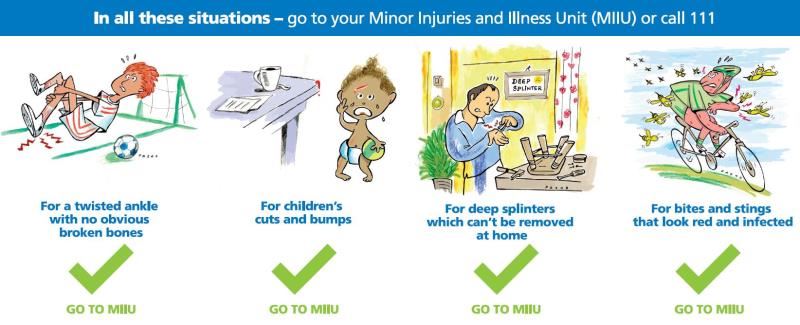Who Do I Need To See
If it is an Emergency: Dial 999
In the event of an emergency you should contact the emergency services.
If it is NOT an Emergency:
Your local Minor Injuries and Illness unit is located at Wycombe Hospital, Queen Alexandra Road, High Wycombe, Bucks HP11 2TT
If you are unsure call NHS 111, calls to this number are free from landlines and mobiles.


Ask First - Sensley

Mental Health Support via KOOTH
At this uncertain time for many young people around results days and thinking about transition back into schools and colleges. KOOTH service is commissioned in your area for 11 – 18 year olds and is available for wellbeing advice and support.
Kooth have seen increasing use of their service by young people during and post the lockdown period and beyond and have produced data releases to show what users have been concerned about. These can be found here under the Covid-19 option.
For Sexual Health Information
For information on sexual health services available out with the surgery please visit: www.sexualhealthbucks.nhs.uk and / or https://www.tht.org.uk/sexual-health/Young-people/Young-and-Free
For Relationship Advice
If you are experiencing any of the following:
- Relationship difficulties of any kind
- Difficulties with sex
- Parenting or family-life difficulties
- Marital, separation or divorce issues
- If you are a child or a young person and need to talk to someone in confidence (i.e. without any chance of them telling anyone else)
- If you are an older person and need to talk to someone in confidence
- Or if you just need someone to talk to
Then a relationship support service can help you.
One example is The Relate Organisation, which has offered a very high level of support to many of our patients in the past.
To contact the service you can Click Here:
Problems with your teeth?
For any dental related problem your dentist is the best clinician to see, not your GP.
We understand that it can be worrying due to possible associated costs with dental appointments. Please see link below for support with dental costs.
https://www.nhs.uk/using-the-nhs/help-with-health-costs/get-help-with-dental-costs/
Problems with your feet?
f you are experiencing problems with your feet you may need to see a chiropodist or podiatrist. Unless you have health complications such as diabetes you can self refer to both these services.
There is a private chiropodist who works out of the surgery, Claire Rose and details of how to make an appointment are available via our reception.
For a podiatrist, you need to complete a self referral form which will allow you to access a free NHS service. Please download the form below and post to the address located on the second page.
Problems with your eyes?
Your eyes are cared for by a number of different professionals.
Opticians: "Optician" is still the term most of us associate with their eye healthcare professional. However, the term is being used less and less within the profession and it is important you know who you are dealing with when you have your eye care appointment. When you visit an optician, you'll have your sight tested by an ophthalmic practitioner, which can mean either an optometrist or an ophthalmic medical practitioner.
Optometrists: Optometrists are trained to recognise, treat and manage abnormalities and signs of some, but not all, eye diseases. Like eye surgeons (ophthalmologists), they examine the internal and external structure of your eyes to detect diseases like glaucoma, macular degeneration, and cataracts. They may also test a person's ability to focus and coordinate the eyes and see depth and colours accurately. Optometrists do not perform surgery. If necessary, the optometrist will refer you on to your GP or an eye clinic for further investigations.
Optometrists can prescribe and fit glasses, contact lenses and low vision aids. They can also prescribe eye exercises, undertake vision therapy, and, if trained to do so, prescibe medications to treat eye diseases.
Opthalmologists: Ophthalmologists (eye surgeons) are doctors that specialise in the medical and surgical care of your eyes and the visual system. They also look into the prevention of eye disease and injury. An ophthalmologist treats patients of all ages, from premature babies to the elderly. The conditions dealt with in ophthalmology can range from eye trauma to cataracts, diabetic eye diseases, such as diabetic retinopathy, congenital and genetic eye problems.
To see an opthalmologist you will need to be referred. Occasionally these referrals originate in General Practice, for example if we notice problems with your eyes, but more commonly the referrals originate from the opticians and optometrists who have the necessary equipment (and skills of course) to detect problems with your eyes.
Orthoptists: Orthoptists form part of the eyecare team and generally work closely together with ophthalmologists, ophthalmic practitioners and vision scientists. Their main role is to investigate and identify problems relating to the development of the visual system, including:
- squint and lazy eyes in children
- adults with learning difficulties
- adults with double vision
Orthoptists also investigate, diagnose and assist in the treatment of conditions such as glaucoma, cataract, retinal disease, stroke and other neurological disorders.
Eye Casualty: Stoke Mandeville Hospital Operates and Eye Casualty service. This can be accessed via the Emergency Department or via your GP - we can usually arrange for you to be seen there within a day. This service is for very urgent problems, that are not emergencies. If you have any doubt how urgent your particular problem is, dial 111 and tell them what has happened and the team there will ensure you get the help that you need.
A&E: In the event of an emergency you should dial 999.
Some eye problems - for example trauma need to be seen in A&E in Stoke Mandeville Hospital, while others, for example sudden loss of vision (even if it was brief) may need to be seen in the Cardiac Stroke Investigation Unit which is based in Wycombe Hosptial.
You do not need to worry about logistics, just dial 999, tell them what has happened and the team there will ensure you get the help you need.
Problems with your ears?
As with your eyes, your ears are cared for by a number of clinical professionals.
For problems such as ear irritation and infection we can help you. You would typically need to book in to see one of our nurses who will check your ears. If necessary the nurse will ask a doctor to check your ears at the same time.
Wax - Many patients book appointments to have their ears syringed to try and improve their hearing by clearing out the wax. This procedure is NOT RISK FREE. It is NOT good to have ear syringing performed as a routine procedure, it is best to try and break the cycle as syringing could lead to other more serious problems.
Ear wax forms a protective coating of the skin in the ear canal. Wax is NORMAL. Small flakes or crusts of wax break off and fall out of the ear from time to time. The quantity of ear wax made varies greatly from person to person. A plug of wax in the ear is not a serious problem, more a nuisance. You only need to remove if it is causing symptoms of great discomfort.
Do not try and clean the ear canal with cotton wool buds this can make things worse by pushing the wax deeper inside and could cause an ear infection. Let the ear ‘clean itself’.
If you feel your ears are blocked with wax we would encourage you to insert 1-2 drops of olive oil twice a day into the affected ear for 7 days and book an appointment with one of our nurses following the 7 days application to check your ears. Unfortunately, we do not offer an ear syringing service however we will be happy to check your ears and if feel a wax issue direct you to an appropriate service locally.
How to use ear drops:
- Olive oil encourages the natural movement of wax from the outer ear.
- Lie down on your side with the affected ear upwards.
- Gently pull the outer ear backwards and upwards. Using room temperature olive oil and the dropper drop 1-2 drops in the ear canal and gently massage the area in front of the ear.
- Remain lying down for 10 mins. and then wipe away excess oil. DO NOT put any cotton wool in your ear canal as this will absorb the oil.
- Repeat the procedure with the opposite ear if necessary.
Local microsuction, a safer option than syringing is available at Specsavers (High Wycombe) 01494 520304 or Aston Hearing services (Amersham) 01494 733840 for a charge.
After your ears have cleared naturally or been syringed, oil should be used in your ears once or twice a week to keep the wax soft.
If you have a lot of ear wax, it may be necessary to soften the wax with olive oil or an over the counter equivalent product.
This usually needs to be done for 10-14 days to ensure the wax is soft enough to clean out.
The Community ENT Service
We benefit locally from an excellent ENT service based in Beaconsfield.
They offer a number of additional services relating to ears / balance and hearing.
This service is paid for by the NHS and your GP will need to refer you to them.
Page created: 26 October 2022